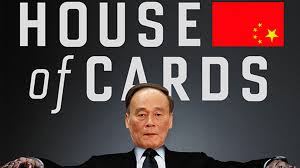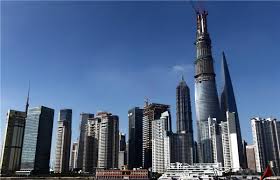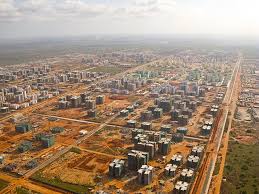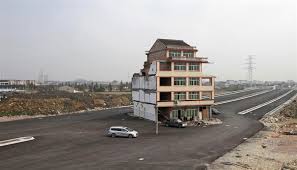
Last night’s BBC2 documentary “How China Fooled the World” by Robert Peston was a fascinating insight into the huge £400 billion Chinese investment programme over the last 5 years and its potential future impact. Certainly it all looks like a house of cards with plenty of risks ahead.
Peston highlights that since 2008, “China has built a new skyscraper every five days, more than 30 airports, metros in 25 cities, the three longest bridges in the world, more than 6,000 miles of high speed railway lines, 26,000 miles of motorway…..”. This explosion of building has been financed by a surge in lending by Chinese banks. China’s total debt has risen from 125 per cent of GDP in 2008 to more than 215 per cent now – an increase in borrowings of $15 trillion – the size of the entire United States commercial banking sector.
httpv://www.youtube.com/watch?v=YW3h4wv8_ko
How China Fooled the World Documentary
Even when Beijing have tried to reign in regional and provincial governments to slow things down, financial institutions have resorted to the shadow banking system, a way to lend money off the balance sheet. China’s big banks have strict lending requirements, giving preference to large state-owned enterprises, so many companies and even government entities are having to look elsewhere for loans. Inevitably, they turn to the so-called shadow banking sector, a sector probably worth around $5 trillion. There are no exact figures, but it’s estimated at potentially the equivalent of 40 per cent of China’s entire GDP. China’s central bank wants to restrain shadow lending but has shown little interest in shutting it down entirely.

Fears about China’s banking system were highlighted in January because of the growth of financial products called WMP’s (wealth management products). In January, Industrial & Commercial Bank of China Ltd. (ICBC), the world’s most profitable bank, initially rejected calls to compensate holders of A $500 million WMP to to raise funds for a coal miner. The borrower, Shanxi Zhenfu Energy Group, collapsed in 2012 after leading shareholder Wang Pingyan was arrested for illegal deposit-taking. Payment on the three-year, so-called Credit Equals Gold No. 1 product was due January 31st 2014. This particular WMP had a three-year maturity and was supposed to bring a return of between 9.5 percent and 11 percent—far above the 3 percent deposit rate banks are paying. Investors in this trust were apparently offered “implicit guarantees” of repayment by ICBC. This particular crisis was resolved when an agreement was made to compensate investors, but this is probably the tip of the iceberg in terms of non-performing financial instruments with loans for “white elephant” projects.
These shadow trusts are similar to structured investment vehicles prominent in the 2008 crisis in the U.S. with their links with banks, their off-balance-sheet nature and the long-term projects funded by short-dated funds.

Property prices in China are rising at 20 percent plus every year, with huge new high rise blocks being constructed in new cities like Wuhan which is spending £200 billion to create a mega city which includes a 600 metre tower costing £3 billion. Yet in many cities, the astronomical cost of these new apartments mean that ordinary Chinese and even the new Chinese middle class cannot afford them and rich investors pick them up which means they lie empty. In the Wuhan tower, apartments are selling for £350,000 or so when the average Chinese wage is more like £3000 a year. Ordinary Chinese are wondering when the bubble will burst since everyone knows that the properties are overvalued, but they just keep going up.
So run away property prices, debt going through the roof, cheap credit- a re-run of the 2008/2009 U.S. driven financial crisis involving sub-prime mortgages? Remember Lehman, Bear Stearns, Northern Rock etc. etc. ??
Peston’s programme put the Chinese economic miracle into context and to me highlighted the significant risks ahead. With growth coming from a debt fuelled state investment programme since 2008, he points out the the Chinese are still saving too much (30% of their income versus 5% in the UK) and this lack of consumption means that the Chinese economy is intrinsically unbalanced.
As he points out, “Before the crash, investment was the equivalent of about 40% of GDP, around three times the rate in most developed countries and significantly greater even than what Japan invested during its development phase – which preceded its bust of the early 1990s. After the crash, thanks to the stimulus and the unleashing of all that construction, investment surged to an unprecedented 50% of GDP”.

With Chinese GDP growth expected around 7% this year, the Chinese economic miracle still appears to be alive and well. But will it last? Huge stadiums with no crowds, roads going nowhere, empty apartments, shopping centres with no open shops, all ring alarm bells. The rise in credit and booming property prices can’t last and nor can the 7-10% economic growth the country has seen over recent years. But if China catches a cold, the rest of the world might well become sick too. Good stuff from the BBC and Robert Peston.
Contrarian Investor UK
IMPORTANT: The posts I make are in no way meant as investment suggestions or recommendations to any visitors to the site. They are simply my views, personal reflections and analysis on the markets. Anyone who wishes to spread bet or buy stocks should rely on their own due diligence and common sense before placing any spread trade.
by contrarianuk
Robert Peston’s “How China fooled the world” documentary highlights that country might be house of cards
Feb 19, 2014 at 6:57 am in Market Commentary by contrarianuk
Last night’s BBC2 documentary “How China Fooled the World” by Robert Peston was a fascinating insight into the huge £400 billion Chinese investment programme over the last 5 years and its potential future impact. Certainly it all looks like a house of cards with plenty of risks ahead.
Peston highlights that since 2008, “China has built a new skyscraper every five days, more than 30 airports, metros in 25 cities, the three longest bridges in the world, more than 6,000 miles of high speed railway lines, 26,000 miles of motorway…..”. This explosion of building has been financed by a surge in lending by Chinese banks. China’s total debt has risen from 125 per cent of GDP in 2008 to more than 215 per cent now – an increase in borrowings of $15 trillion – the size of the entire United States commercial banking sector.
How China Fooled the World Documentary
Even when Beijing have tried to reign in regional and provincial governments to slow things down, financial institutions have resorted to the shadow banking system, a way to lend money off the balance sheet. China’s big banks have strict lending requirements, giving preference to large state-owned enterprises, so many companies and even government entities are having to look elsewhere for loans. Inevitably, they turn to the so-called shadow banking sector, a sector probably worth around $5 trillion. There are no exact figures, but it’s estimated at potentially the equivalent of 40 per cent of China’s entire GDP. China’s central bank wants to restrain shadow lending but has shown little interest in shutting it down entirely.
Fears about China’s banking system were highlighted in January because of the growth of financial products called WMP’s (wealth management products). In January, Industrial & Commercial Bank of China Ltd. (ICBC), the world’s most profitable bank, initially rejected calls to compensate holders of A $500 million WMP to to raise funds for a coal miner. The borrower, Shanxi Zhenfu Energy Group, collapsed in 2012 after leading shareholder Wang Pingyan was arrested for illegal deposit-taking. Payment on the three-year, so-called Credit Equals Gold No. 1 product was due January 31st 2014. This particular WMP had a three-year maturity and was supposed to bring a return of between 9.5 percent and 11 percent—far above the 3 percent deposit rate banks are paying. Investors in this trust were apparently offered “implicit guarantees” of repayment by ICBC. This particular crisis was resolved when an agreement was made to compensate investors, but this is probably the tip of the iceberg in terms of non-performing financial instruments with loans for “white elephant” projects.
These shadow trusts are similar to structured investment vehicles prominent in the 2008 crisis in the U.S. with their links with banks, their off-balance-sheet nature and the long-term projects funded by short-dated funds.
Property prices in China are rising at 20 percent plus every year, with huge new high rise blocks being constructed in new cities like Wuhan which is spending £200 billion to create a mega city which includes a 600 metre tower costing £3 billion. Yet in many cities, the astronomical cost of these new apartments mean that ordinary Chinese and even the new Chinese middle class cannot afford them and rich investors pick them up which means they lie empty. In the Wuhan tower, apartments are selling for £350,000 or so when the average Chinese wage is more like £3000 a year. Ordinary Chinese are wondering when the bubble will burst since everyone knows that the properties are overvalued, but they just keep going up.
So run away property prices, debt going through the roof, cheap credit- a re-run of the 2008/2009 U.S. driven financial crisis involving sub-prime mortgages? Remember Lehman, Bear Stearns, Northern Rock etc. etc. ??
Peston’s programme put the Chinese economic miracle into context and to me highlighted the significant risks ahead. With growth coming from a debt fuelled state investment programme since 2008, he points out the the Chinese are still saving too much (30% of their income versus 5% in the UK) and this lack of consumption means that the Chinese economy is intrinsically unbalanced.
As he points out, “Before the crash, investment was the equivalent of about 40% of GDP, around three times the rate in most developed countries and significantly greater even than what Japan invested during its development phase – which preceded its bust of the early 1990s. After the crash, thanks to the stimulus and the unleashing of all that construction, investment surged to an unprecedented 50% of GDP”.
With Chinese GDP growth expected around 7% this year, the Chinese economic miracle still appears to be alive and well. But will it last? Huge stadiums with no crowds, roads going nowhere, empty apartments, shopping centres with no open shops, all ring alarm bells. The rise in credit and booming property prices can’t last and nor can the 7-10% economic growth the country has seen over recent years. But if China catches a cold, the rest of the world might well become sick too. Good stuff from the BBC and Robert Peston.
Contrarian Investor UK
IMPORTANT: The posts I make are in no way meant as investment suggestions or recommendations to any visitors to the site. They are simply my views, personal reflections and analysis on the markets. Anyone who wishes to spread bet or buy stocks should rely on their own due diligence and common sense before placing any spread trade.